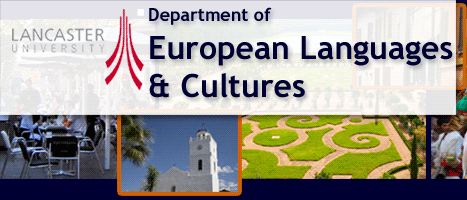
NEWS AND EVENTS ARCHIVE (2009-2014)
Archive
Art and Cultural Production within Institutions and on the Margins of Society - DELC Reading Group
Date: 14 December 2011 Time: 5.00 pm
Venue: B88 Bowland North
"Hans-Georg Gadamer, Truth and Method" 5th German edition Transl. Weinsheimer and Marshall (2011) to be introduced by Robert Crawshaw (Department of European Languages & Cultures)
Hans-Georg Gadamer (1900-2002) is recognised as the leading post-war proponent of the hermeneutic movement which had developed during the inter-war period in Germany and came to fruition in the 1950s before being overtaken by the advent of structuralism and the Marxist-inspired rise of the Frankfurt school. As such, he can be placed in the same tradition as Friedrich Schleiermacher, Erich Auerbach, Leo Spitzer and later Georg Steiner, although he takes issue with certain of their positions. Hermeneutics is a means of enhancing understanding through text, a form of close reading which enables the subject to identify with the creative process of an author/artist (though not with his/her intention) and through the text to position the writer's thought in an historical moment. It epitomises a diachronic understanding of culture as rooted in a past whose evolution can be traced philologically ie the form and structure of language represents the changing character of culture through time and acts as an agent to bring this about. As such 'the text' offers the reader an opportunity to experience history as part of a cumulative process of acquiring knowledge. This experience is not an idealised aesthetic insight on the part of the subject reader. Rather the reader enters into a dialogue with the text, progressively deepening an understanding of its meaning and thence relating its internal properties to those of other artefacts of the same period.
'Truth' is vested in the internalisation of another person's expression which is best exemplified through the penetration of textual meaning. The identification of text with the creative output of an individual - albeit as symbolic of an historical moment - and the fact that the process of experience (Erfahrung) - progressive learning - is undergone by a subject, together with the fact that the object of hermeneutic investigation is mostly literary text (language of a higher order - cf Ernst Cassirer's notion of reine Bedeutung/pure meaning), all this has caused the hermeneutic school to be associated with a traditional, 'high culture' aestheticised approach to literature and language. It is therefore often seen to be in opposition to more modern discursive models of the role played by language in society exemplified by Foucault or Luhmann. Yet it is debatable whether the separation between discourse and 'text' as represented by the hermeneutic tradition is in fact as great as is sometimes supposed. Gadamer was closely associated both with Martin Heidegger and later with Jurgen Habermas and sought to extend the analysis of understanding beyond written text. The hermeneutic principle is arguably as applicable to transcripts of conversations as it is to literary output.
Contact:
Who can attend: Anyone
Further information
Associated staff:
Organising departments and research centres: European Languages and Cultures
Keyword: